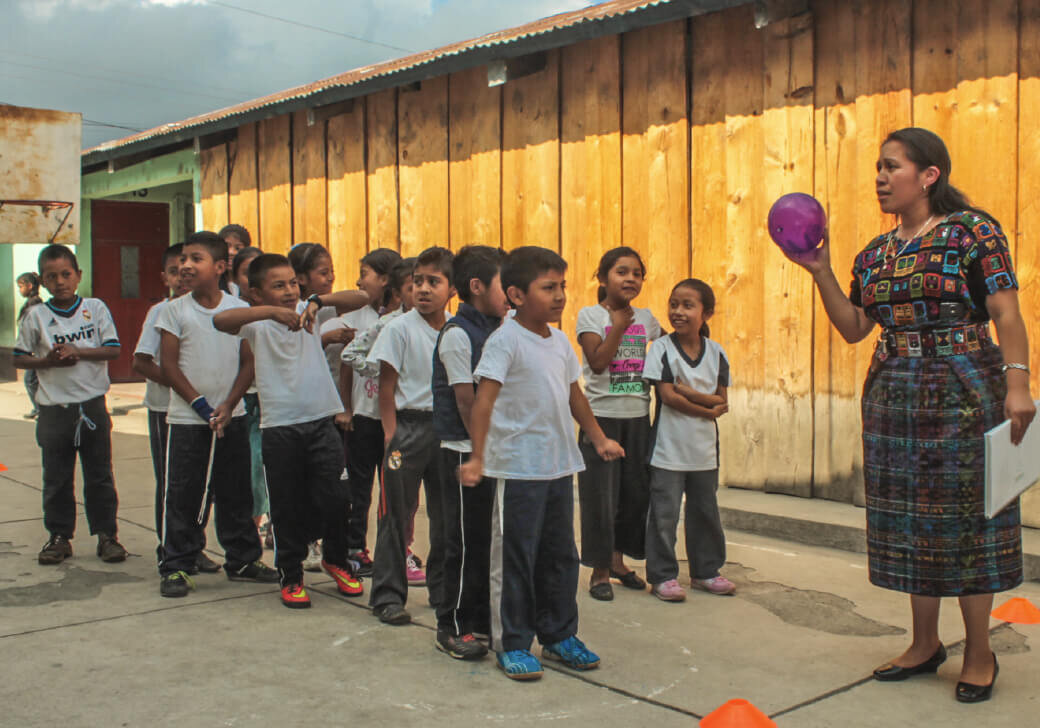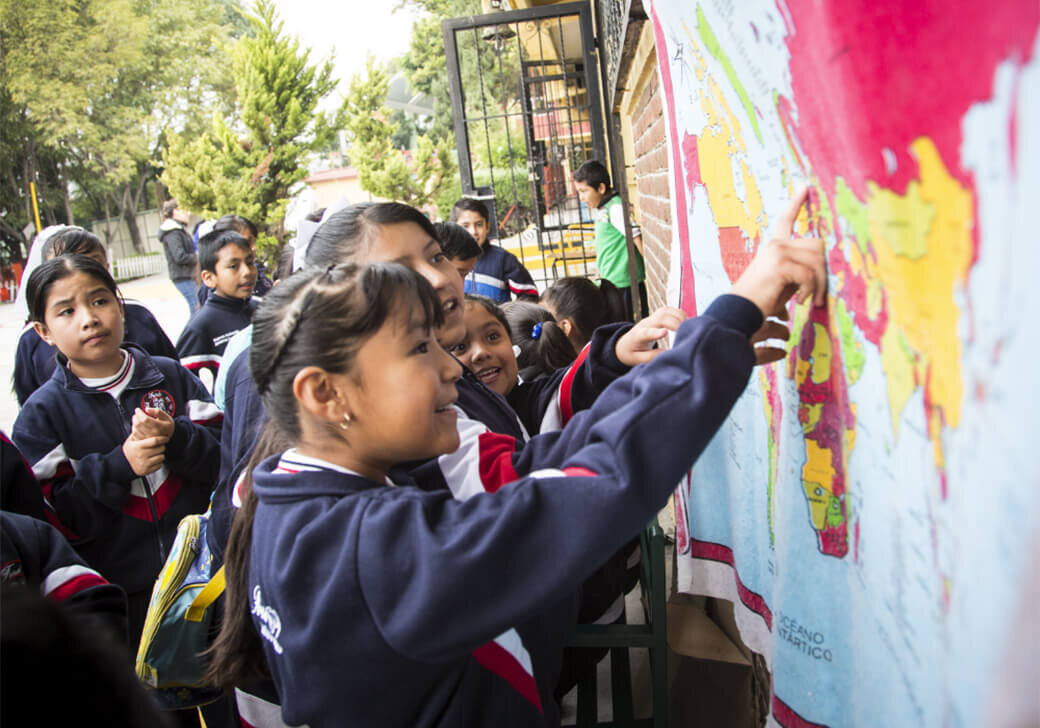Thanks to its innovative dialogue mechanism between teachers and students through playing, the international organization of Mexican origin, Education for Sharing, was awarded the 2020 WISE Awards.
Every year, the WISE Awards from the prestigious Qatar Foundation recognize the world’s most innovative projects that address today’s educational challenges. Last year, the international organization of Mexican origin, Educación para Compartir (EpC) or Education for Sharing (E4S), was awarded by WISE for its innovative methodology, being the first time in the history of these awards that a Mexican organization wins this award.
Based in Mexico City, education for Sharing is an international non-profit organization that trains global citizens through an innovative educational model based on play’s power. The E4S methodology uses a “play-reflect-act” framework that encourages teachers to teach dynamically and encourages girls’ and boys’ participation. By linking a school’s curriculum to the United Nations Sustainable Development Goals (SDGs), the project also provides teachers with the skills and tools necessary to structure their classes in ways that empower students to be global agents of change.
To learn more about this project and its methodology, we spoke with Dina Buchbinder Auron, Founder and President of Education for Sharing. Below, we share an excerpt from this interview.
Observatorio (OB): How did E4S originate?
Dina Buchbinder (DB): We began in 2007 with the dream of forming better global citizens, starting from childhood. The idea was always to use a fun, inclusive, healthy methodology that would genuinely move us as people, as societies, as a planet.
We wanted to achieve this with a sharing philosophy. That is why it’s called Sharing Education because it is for everyone. We are convinced that all people have something valuable to share, that we are all potential agents of change, regardless of the context or circumstances of our birth and development.
We have committed ourselves to the task of working with diversity. As the button shows, we started with a pilot program in 2007 in four very diverse places throughout our country (Mexico). We started in the Sierra Tarahumara with Rarámuris girls and boys; simultaneously, in two private schools in Mexico City, very different from each other, one at the Central de Abastos and one in Polanco; and a public school in Cancun, Quintana Roo. We were creating a team, understanding that this was something necessary throughout all of Mexico and beyond. With this methodology, we could address root problems such as corruption, apathy, discrimination, and violence, which are the root problems advised in the Sustainable Development Goals (SDGs).
OB: Tell us how your methodology works; how did it come about?
DB: Our methodology arises from a desire to transform the way we learn because we know that it is not ideal to be sitting passively receiving information. As a little girl, I had that yearning to move and play to learn and connect. I think the same thing happens to most people.
We can develop other skills and competencies, such as collaboration and creativity when we keep active in our bodies, minds, and emotions.
Through play, we tackle very abstract themes with our methodology, like those of the Sustainable Development Goals, including civic values such as sportsmanship, teamwork, respect, tolerance, and responsibility. These are values that we all know are important, but the hard part is knowing how we can implement them in our day-to-day lives. Our methodology is about translating socio-emotional skills into practice through cooperative games.
We have seen something fundamental repeatedly over the fourteen years we will have been in existence in March. We have seen on every occasion during our opportunity to work with 1.3 million children, parents, and teachers that it is indeed very empowering to learn differently. With emotion, with curiosity, nurturing the desire to improve our world, I want to find a purpose, to serve our community, to realize that we have crucial roles to play in our communities. We can discover that we do not have to spend a lifetime to realize that we have a role in this world at a young age. We can find that role as children, which could make an enormous difference to the world.
OB: You see children as agents of change, people who reflect, who act, who propose. Often, this does not happen in school or society. We do not involve children in “adult issues.” That is why it comes to my attention that at E4S, children are treated as people and agents of change.
DB: A fascinating comment you make is that we have an ingrained idea that children should not have an opinion or think about possibilities and solutions. Often, when we ask them in the entrance surveys if they believe they can make a difference in the face of these significant challenges, they usually respond, “Well, I’m tiny, and these challenges are huge.” It is funny because when we ask adults the same thing, they answer something very similar.
A very worthwhile thing would be to take that idea out of our heads and say, “We may be small compared to the magnitude of these challenges, but that is not the way to address them.” The way to approach them is, “We all have something to contribute, and, together, we are stronger.” We can do this today and forward.
Our methodology translates socio-emotional skills into practice through cooperative games.
OB: How do you encourage reflection and citizen participation in children?
DB: That is the core of the methodology; you hit the nail on the head. The mechanism to activate that reflection is the cooperative game, the game as a laboratory and a place for exploration. We play, have fun, connect, and address some SDG issue in every game to discover how our values can be put into practice, or not, to help understand these problems and do something as agents of change.
After each game, we do a “circle of reflection,” generating questions to trigger girls and boys to draw conclusions about what happened in the game, what it was about, who participated and who don’t, whether they felt there was fair play or not, and what might have been different. Then in these games, ideas begin to emerge from what they lived and experienced, not from declarations like, “You have to take care of the environment,” or “You have to know A, B, and C.” This is how we get them to want to participate and generate ideas for change.
OB: It’s fascinating what you mention about not starting from a “you have to…” It makes a huge difference when you approach children (or even adults) and impose a rule on them; for example, “you have to wear a mask,” but without explaining why and, above all, without receiving their viewpoint.
DB: On that last point, we have a program called “Sharing Initiatives,” which is project management for girls and boys. These initiatives arise from their desires, interests, and curiosity to share something with their community. The childr
en make a pitch to their class with these ideas. It is the first time that they vote democratically. They hold a voting exercise where they present their concept to the rest of the class. Afterward, they vote and choose the initiative that excites them the most. Then, they carry out this initiative for the next six months and present it to their community.
Photo courtesy of Education for Sharing.
OB: Do you work with children of all ages and educational levels?
DB: Historically, our focus was on the primary school level, but in recent years, we have been replicating our methodology in early childhood and high school. This has allowed us to understand that gaming is a common denominator at any age and is summarily useful for transmitting knowledge at various life stages.
OB: What role does the teacher have in your methodology?
DB: The systemic change we make comes from working with teachers. Our first approach is through the teachers with whom we work hand in hand. We share the methodology for them to take ownership of it.
We work with them throughout the whole school year. It is not about giving them a talk and saying they already have the methodology. We have realized that we end up learning much more from the teachers by seeing how they take in this methodology and expand it. It is not about going and handing them [a methodology]. It is about constructing, hand-in-hand, a co-construction of mutual learning.
OB: How do you perform these interventions in the schools?
DB: We typically make partnerships with the public and private sectors, as we began in 2008, through an alliance between SEDESOL and the National Commission for the Development of Indigenous Peoples.
On the other hand, we have received endless requests from school systems and teachers who hear about us through word of mouth. We also go school-to-school, offering the methodology. We map the schools that need it and are interested in testing our methods.
OB: Approximately how long does it take to apply this methodology in a school?
DB: One year, on average, ranging from six months to a year, depending on the project. However, it is a methodology that requires particular logistics because we hire young graduates from local universities to give them their first job and train them in project management, communication, negotiation, and methodology. The training is very holistic, so they can have practical tools to be proud of their first job. It truly is an exceptional first job, where the young people realize that their time is worth a lot and that it is crucial from the beginning to connect their work lives with something that has a purpose.
OB: How do you focus your methodology on the Sustainable Development Goals (SDGs)?
DB: We have been working with these SDGs since they were the millennium goals. We have been translating these goals into games and activities, reflection, and action. When the new SDGs were released, we committed to translating all the sustainable goals into games and activities.
We use the games as a vehicle to explain these significant global challenges. In a practical, tangible way, through games, girls and boys understand the SDGs’ essence and that they are very ambitious and necessary goals. They can translate them into something familiar to them because they are human issues; they are human rights.
We are delighted because recently, we publicly and proudly presented the book for sixth grade in all of Mexico, a booklet on the 2030 Agenda in which E4S is a co-author. It is the first book of its kind in Mexico and will be given to millions of Mexican children.
Adults have an ingrained idea that children should not have an opinion or think about possibilities and solutions.
OB: The fifth goal of sustainable development is gender equality. How do you work on this particular goal in Mexican communities where gender machismo and violence are ingrained?
DB: Two things come to mind that I would like to share: We have had to work in communities where the girls covered their faces before participating. When we asked them something in principle, they covered their faces or mouths with their arm. So, it is fantastic to see how this specific intervention using games breaks patterns that have been ingrained for generations. It is incredible to see the transformation that the game can generate because we saw how the girls and boys began to interact differently after three or four sessions. They began to dignify their voices, use their voices, and position themselves (act) differently.
In another training, I was very moved that an indigenous school leader in Guerrero began to cry during the training as if he had “hit bottom” very profoundly through playing and set off deep feelings. He realized that he could change and that he could have different dynamics and relationships with women. So that was very moving for him and the whole group.
OB: Within your philosophy is “Fair Play.” Could you explain what you mean when you talk about fair play
DB: Corruption is not an exclusive phenomenon in Mexico. It permeates societies in every corner of the world. So it seems crucial to us to de-normalize this phenomenon that we all have deeply rooted in everyday life to some degree. Fair play is how a society can achieve its goals by working with transparency, trusting people, feeling safe in the environment.
We want to promote that girls and boys can see that playing fair suits them; it will make them happier and go further. They must see that not playing fair is strange, and when they see it, it makes them short circuit. There are times when you do not notice it. For this, we have a tool called “corruptometer,” with which they do a very simple self-assessment about day-to-day issues.
Photo courtesy of Education for Sharing.
OB: What role do families play in your methodology? How do you involve them in the process of change?
DB: This is maximal important. We have noticed the clash between teachers and parents. There is continuous tension because, broadly, teachers think that families do not participate enough and, on the other hand, parents believe that teachers are lazy and do not give it what they could. So, instead of working as a team for a common purpose, they are at constant odds and tension.
Therefore, we invite parents to participate in sessions to play and be seen in another dimension, not only in a transaction dynamic but also in a dynamic of people who have a common purpose.
OB: How has your methodology changed because of the pandemic? What changes have you made to adapt to post-pandemic times?
DB: The pandemic shook us like everyone else. Our work was mainly in person in the schools, in the communities. However, we quickly adapted and poured all our efforts into translating our activities into the digital environment to remain useful for teachers and families who must now be at home.
We then created a series of tutorials, experiments, games, and all the thematic activities that typically have to do with our philosophy and methodology. The response was surprising because, in almost 14 years, we had the privilege of working hand in hand with 1.3 million people; however, we have reached 2.7 million people in a few months with this online methodology.
We have also been surprised to turn the pandemic around to make the best of this crisis, transforming it into an opportunity for community service and remaining useful by accompanying the community at this difficult time.
The pandemic has made everyone realize the significant digital gap in the world and how far we are from feeling comfortable migrating our classes to the virtual world. We are convinced that with the experience we have developed working hand-in-hand with about 20 thousand teachers in these years, we have a more precise notion of how children learn, what interests them, what does not engaged them, and what excites them.
OB: What are the plans for E4S’s future? In October last year, you were honored with the WISE Award. What comes after this?
DB: We are an organization proudly born in Mexico, and we like to say that it is an initiative “from Mexico to the world.” It is not that we have the solution, but we have a clear, grounded, authentic, fun, and even healthy solution. We have been testing this methodology for 14 years. We want to share it with the world, other geographies, other realities.
To achieve this, we will develop this digital arm, a digital offering enabling us to continue working with teachers to close the pedagogical gap and transform the way we learn. Simultaneously, we aim to close the digital gap by educating communities with these digital tools to translate what we do digitally, playfully, and humanely.
OB: For those interested in contacting you in testing this methodology, how can they reach you?
DB: They can do it through our website: https://educacionparacompartir.org/ and also through our social media. We are on Twitter, Facebook, YouTube, and Instagram.
Translation by Daniel Wetta.
This article from Observatory of the Institute for the Future of Education may be shared under the terms of the license CC BY-NC-SA 4.0 
)
)




)